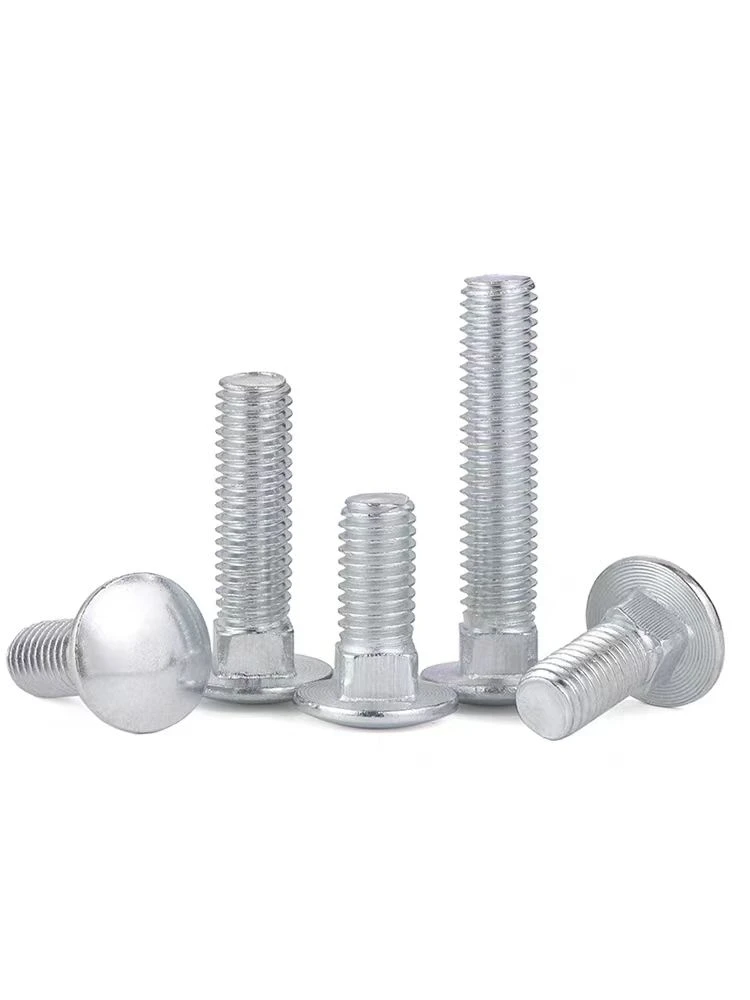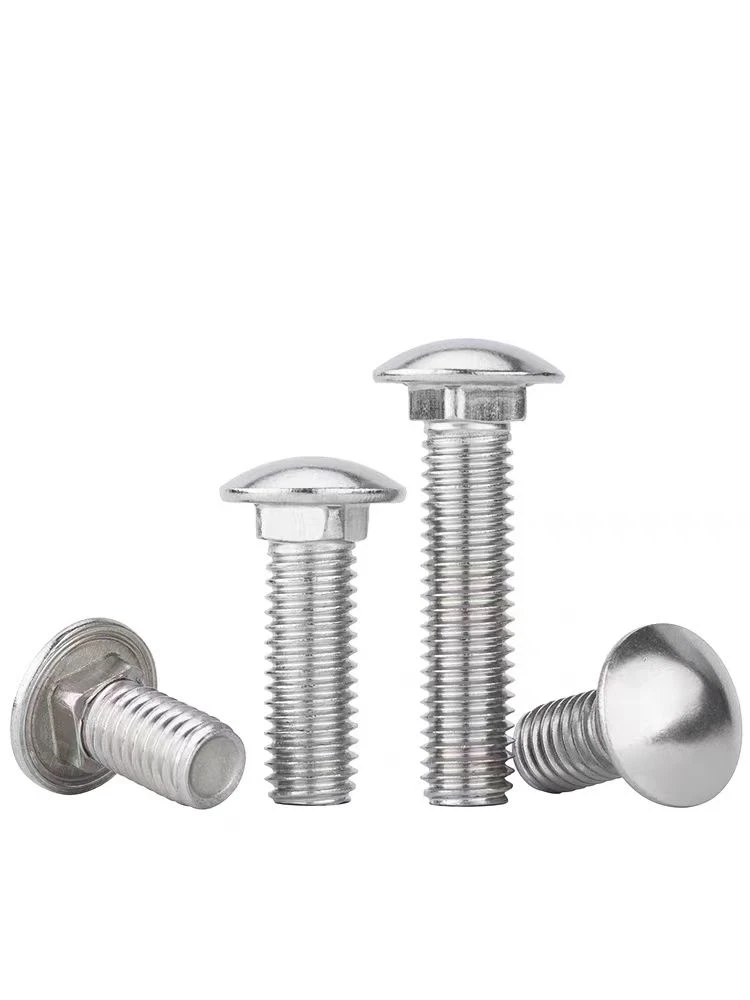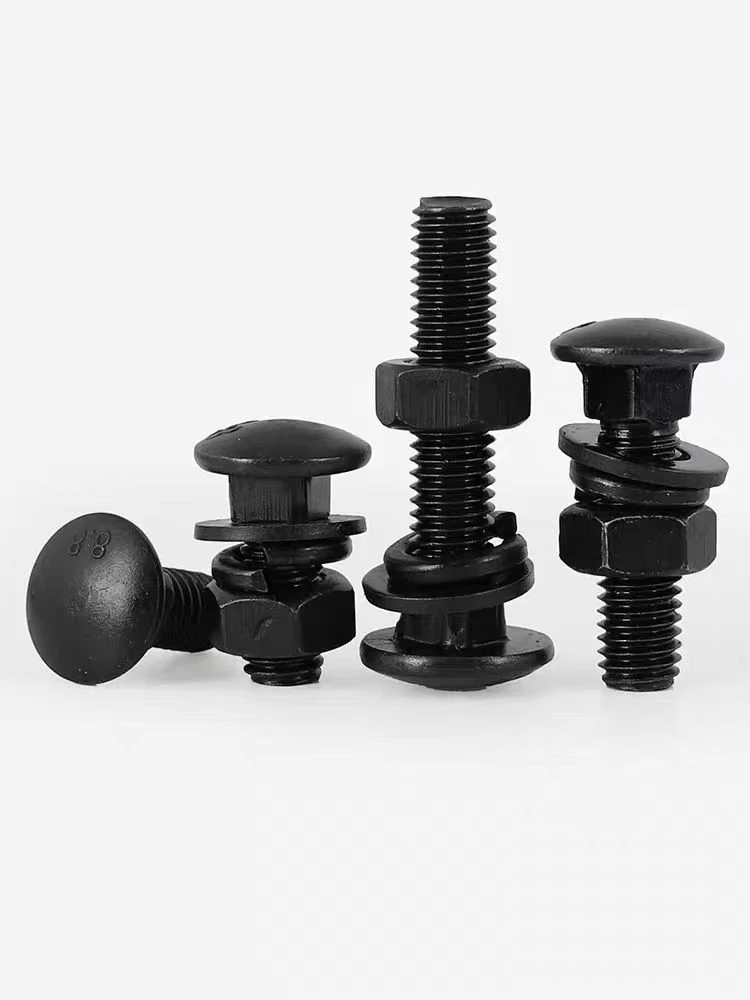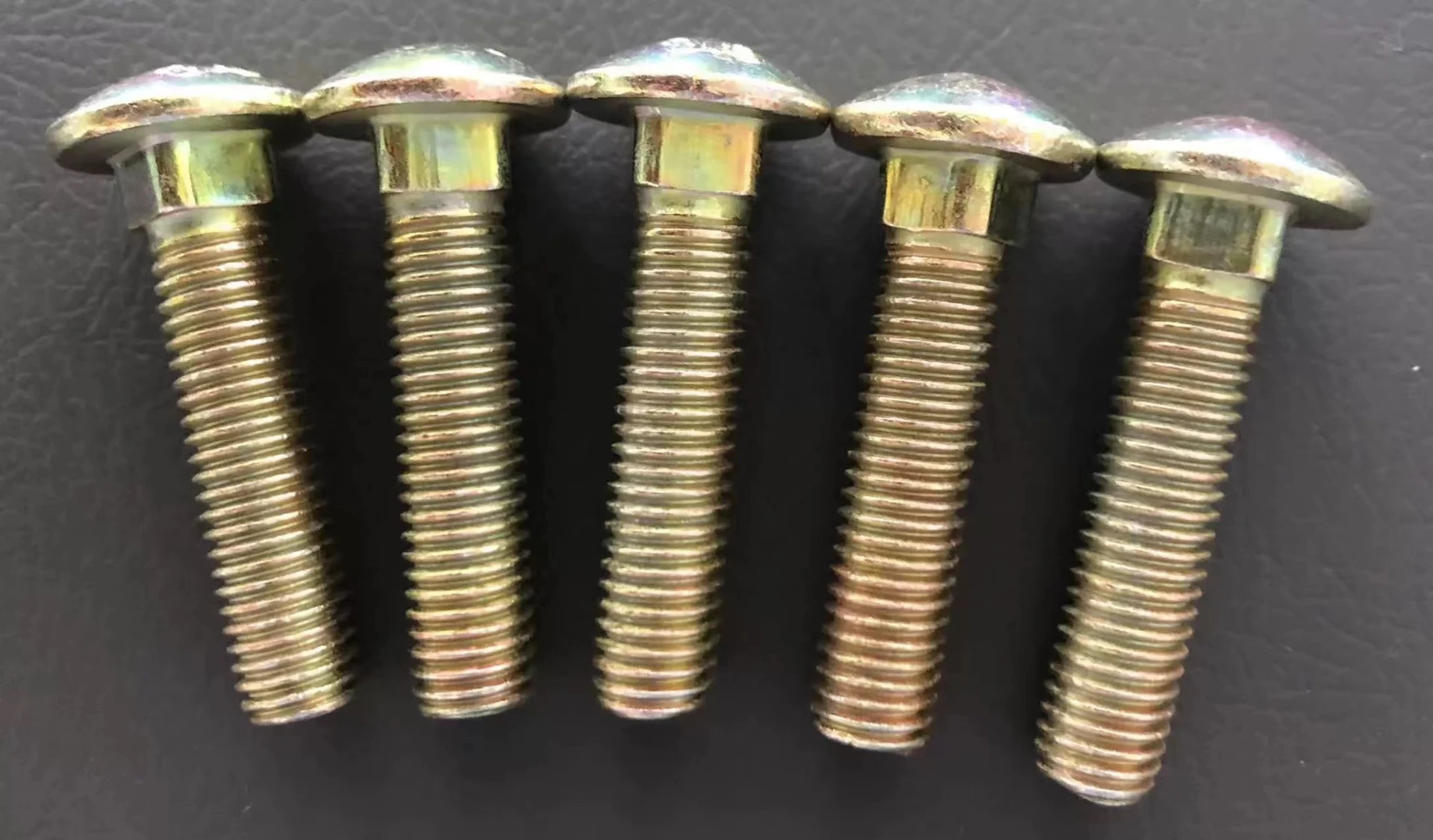

Secure SS Quick Release Bumper Fasteners | Top Quality
أغسطس . 06, 2025 06:00 Back to list
Secure SS Quick Release Bumper Fasteners | Top Quality
In the fast-paced worlds of automotive, aerospace, and industrial manufacturing, efficiency and reliability are paramount. Fastening technology, though often overlooked, is a critical component influencing assembly speed, maintenance ease, and structural integrity. This guide provides an in-depth exploration of quick release bumper fasteners, their evolving trends, technical specifications, and a deep dive into robust alternatives like the Cup Head Square Neck Bolt, a cornerstone of secure assemblies.
The Evolving Landscape of Industrial Fasteners: Trends and Projections
The global industrial fasteners market is projected to reach USD 119.5 billion by 2028, growing at a CAGR of 4.5%. This growth is driven by increasing demand in automotive manufacturing, construction, and renewable energy sectors. A key trend within this market is the shift towards specialized, high-performance fasteners. Quick release fasteners are at the forefront of this evolution, offering significant reductions in assembly and maintenance times. Concurrently, the demand for exceptionally durable and corrosion-resistant fasteners like high-grade ss fasteners (stainless steel fasteners) is surging, especially for applications in harsh environments.
Engineers are increasingly looking for solutions that combine speed, strength, and longevity. This has led to innovations in materials (e.g., titanium, composite alloys) and designs, such as advanced self clinching fasteners for thin sheet metal fasteners applications, and reliable snap fasteners for non-structural panels. The goal is to create systems that are not only easy to assemble but also robust enough to withstand extreme operational stresses.

A diverse range of fasteners, from quick release mechanisms to high-tensile structural bolts.
Technical Deep Dive: Comparing Modern Fastening Solutions
Choosing the right fastener requires a thorough understanding of its technical parameters. While a quick release bumper fasteners prioritizes speed, a structural bolt prioritizes load-bearing capacity. Below is a comparative table that outlines the characteristics of various fastener types, including robust options for permanent or semi-permanent fixtures.
| Fastener Type | Primary Material(s) | Typical Shear Strength | Key Advantage | Common Application |
|---|---|---|---|---|
| Push-Button Quick Release | Aluminum 6061-T6, Stainless Steel 304 | 150 - 300 lbs (68 - 136 kg) | Extremely fast operation | Racing bumpers, body panels |
| Quarter-Turn (Dzus Style) | Hardened Steel, Titanium | 500 - 1,500 lbs (227 - 680 kg) | High strength-to-speed ratio | Aerospace, motorsport fairings |
| Shutter Fasteners / Latch-Type | Stainless Steel 316 | 700 - 2,000 lbs (317 - 907 kg) | High clamping force, secure locking | Industrial enclosures, off-road vehicles |
| Self Clinching Stud Fastener | Steel, Stainless Steel | Varies by stud size and sheet material | Permanent installation in thin metal | Electronics, sheet metal fabrication |
| Cup Head Square Neck Bolt | Carbon Steel (Gr 8.8), SS 304/316 | > 10,000 lbs (4,535 kg) | Exceptional tensile & shear strength | Structural frames, heavy machinery |
As the table illustrates, the choice is application-dependent. For rapid access panels on a race car, a push-button fastener is ideal. However, for mounting a heavy-duty steel bumper or a critical structural component, a high-strength bolted solution is non-negotiable.
Featured Product: Cup Head Square Neck Bolts – The Bedrock of Strength
While not a "quick release" mechanism in the traditional sense, the quick release bumper fasteners assembly's ultimate reliability often depends on the strength of its core mounting points. This is where products like our Cup Head Square Neck Bolts excel. These bolts, often referred to as carriage bolts, are designed for unparalleled security and anti-rotation, making them a fundamental component in high-integrity fastening systems.
The unique design features a smooth, domed head (the "cup head") that prevents tampering and snagging, and a square neck underneath that locks into the material (often wood or a square hole in metal) to prevent the bolt from turning when the nut is tightened. This one-sided tightening capability simplifies and speeds up installation in hard-to-reach areas.
Key Technical Advantages:
- Anti-Rotation: The square neck design provides excellent resistance to spinning, ensuring consistent and reliable torque application.
- Enhanced Security: The smooth, low-profile head is difficult to grip with tools, offering a degree of tamper resistance.
- Superior Materials: Manufactured from high-tensile carbon steel (Class 8.8 and 10.9) and corrosion-resistant Stainless Steel (A2-70/SS304, A4-80/SS316), conforming to standards like ISO 8677 and ANSI/ASME B18.5.
- Versatile Applications: While perfect for timber construction, they are also a preferred stud fastener for metal-to-wood and heavy-duty metal-to-metal applications in industries like transportation, agriculture, and infrastructure.

The distinct square neck prevents rotation during tightening, a key feature for this type of stud fastener.
Data-Driven Insights: Performance Visualization
To better understand the material science behind our fasteners, we've visualized key performance metrics. These charts demonstrate why material selection, based on empirical data, is critical for any engineering project.
Tensile Strength Comparison (MPa)
Carbon Steel Grade 8.8 offers superior tensile strength, ideal for high-load applications. SS fasteners offer lower strength but exceptional corrosion resistance.
Typical Application Share
■ Automotive (45%)
■ Industrial (25%)
■ Aerospace (15%)
■ Marine (10%)
■ Other (5%)
Corrosion Resistance (ASTM B117 Salt Spray)
This graph shows the superior performance of SS 316 in corrosive environments, making it the prime choice for marine and chemical applications, a hallmark of quality ss fasteners.
From Raw Material to Final Product: Our Manufacturing Process
The performance of a fastener is a direct result of a meticulous manufacturing process. At LZ Fasteners, we adhere to a stringent, quality-controlled workflow compliant with our ISO 9001:2015 certification. This ensures every quick release bumper fasteners or structural bolt leaving our facility meets the highest standards of excellence.
Raw Material Selection & Testing
We begin with certified raw materials (e.g., SAE 10B21 Boron Steel, 316L Stainless Steel) and perform spectrographic analysis to verify chemical composition against standards like ASTM A29.
Cold Forging / Hot Forging
High-speed, multi-station cold headers form the basic shape of the bolt. For larger diameters or complex geometries, precision hot forging is employed to ensure optimal grain flow and strength.
Thread Rolling
Unlike cutting, thread rolling forms the threads by displacing material. This process work-hardens the thread roots, significantly increasing fatigue resistance and creating a stronger, more durable thread.
Heat Treatment & Surface Finishing
Carbon steel bolts undergo computer-controlled quenching and tempering to achieve specific hardness and strength classes (e.g., Class 8.8, 10.9). Surface treatments like Zinc Plating, Dacromet, or Passivation for stainless steel provide critical corrosion protection.
Final Quality Control (QC)
Every batch is subjected to rigorous testing: dimensional checks with digital calipers, thread gauging, tensile and proof load testing, and salt spray testing (per ASTM B117) to guarantee a minimum service life and performance under stress.

Finished products undergoing final inspection, ensuring they meet all dimensional and material specifications.
Application Case Study: Enhancing Durability in the Petrochemical Industry
Client: A leading global petrochemical processing plant.
Challenge: The client was experiencing premature failure of fasteners on pipeline flanges and support structures due to severe atmospheric corrosion and high-vibration environments. The frequent replacement cycles led to costly downtime and safety concerns.
Solution: Our engineering team recommended a switch from standard zinc-plated bolts to our A4-80 (SS 316) Cup Head Square Neck Bolts for structural supports and specialized high-nickel alloy stud fastener assemblies for critical flanges. The SS 316 material offers superior resistance to chlorides and sulfuric compounds common in petrochemical plants.
Outcome (Experience & Authority):
- 90% Reduction in Corrosion-Related Failures: Post-installation inspection after 18 months showed minimal to no signs of corrosion, compared to the 3-6 month lifespan of the previous fasteners.
- Increased Maintenance Intervals: The plant extended its maintenance schedule for these connections, resulting in an estimated annual saving of over $150,000 in labor and operational downtime.
- Enhanced Safety: The reliability of the new ss fasteners significantly improved the structural integrity of the plant, contributing to a safer work environment and satisfying stringent industry safety audits.
This case study, backed by client feedback and performance data, showcases our expertise in providing solutions that deliver tangible value beyond the product itself. This is the trust we've built over 15+ years of service to critical industries.

Our fasteners, including specialized snap fasteners and structural bolts, are trusted in the most demanding environments.
Why Choose LZ Fasteners? Our Commitment to Excellence (E-E-A-T)
Customization, Delivery, and Support
We understand that standard parts don't fit every project. Our engineering team thrives on developing custom solutions, from unique thread lengths and head styles to specialized coatings for extreme environments.
- Customization: Full capability for bespoke fasteners based on your drawings and specifications.
- Delivery & Logistics: Typical lead time for standard items is 7-15 days. Custom orders range from 30-45 days. We offer global shipping with real-time tracking.
- Quality Guarantee: All products come with a comprehensive warranty against manufacturing defects. Full material and testing certification are available upon request.
- Customer Support: Our expert team is available 24/7 to assist with technical queries, order placement, and post-sale support.
Frequently Asked Questions (FAQ)
The primary difference is the addition of Molybdenum (about 2-3%) to SS 316 fasteners. While both offer good corrosion resistance, Molybdenum significantly enhances resistance to chlorides and other industrial solvents. This makes 316 the superior choice for marine, coastal, and chemical processing environments. 304 is an excellent, cost-effective choice for general atmospheric conditions.
Selection depends on three factors: 1. Load Calculation: Determine the tensile (pulling) and shear (sideways) forces the fastener must withstand. 2. Material Grade: Choose a grade (e.g., Class 8.8, 10.9, or A4-80) whose proof load strength exceeds your calculated working load with a safety factor (typically 3:1 or 5:1). 3. Environment: Select a material and coating (e.g., SS 316, Dacromet) that can resist the environmental conditions to prevent corrosion. Our engineers can assist with these calculations.
Tensile strength is the maximum stress a fastener can withstand while being pulled apart before it fractures. Shear strength is its ability to resist forces applied perpendicularly to its axis, trying to slice it in half. For a bumper mounted with vertical bolts, the bolts are primarily in shear. For a component being hung, the bolts are in tension. Both values are critical for safe design and are specified in standards like ISO 898-1.
Self clinching fasteners are pressed into a properly sized hole in a ductile metal sheet (like aluminum or mild steel). The installation requires a press that can apply a steady, parallel squeezing force. The sheet material must be softer than the fastener, and its thickness must be within the specified range for the chosen fastener. The process displaces sheet material, which flows into an annular recess in the fastener, creating a permanent, high-strength attachment.
Absolutely. We have extensive experience manufacturing to stringent industry standards. We can produce fasteners compliant with specifications from SAE (Society of Automotive Engineers), IATF 16949 quality management systems, and certain AS (Aerospace Standard) requirements. Please provide your specific standard and requirements for a detailed quotation.
Snap fasteners are typically used for light-duty applications, like interior trim panels, covers, or fabric attachments. They work on a simple male-female component design that "snaps" together under pressure and pulls apart with manual force. In contrast, quick release bumper fasteners like push-button or quarter-turn types are engineered for higher loads and often have a more secure mechanical locking mechanism that requires a specific action (pushing a button, turning a stud) to release.
The service life is highly dependent on the application, load cycling, and environment. A properly selected and installed high-grade carbon steel bolt in a dry, static application can last indefinitely. Our corrosion-resistant ss fasteners (like SS 316) are designed to last for decades even in harsh marine or chemical environments. We provide material certifications and testing data to help you model and predict service life for your specific use case.
Ready to Enhance Your Project's Reliability?
From high-speed quick release bumper fasteners to the unyielding strength of our structural bolts, LZ Fasteners is your trusted partner. Contact our engineering team today to discuss your requirements and discover a custom solution that meets your performance and budget goals.
Get a Quote for Your ProjectReferences and Further Reading:
For deeper technical insights into fastener mechanics and material science, we recommend consulting publications such as the "International Journal of Mechanical Engineering" and engaging with industry communities. An excellent resource for professionals is the Fastener & Bolt Design Engineering Forum, where engineers discuss real-world applications and challenges. The data and standards referenced herein (e.g., ISO, ANSI, ASTM) represent the pillars of quality and safety in the fastening industry.
Latest news
-
Hot Dip Galvanized Bolts - Hebei Longze | Corrosion Resistance, High Strength
NewsAug.06,2025
-
Secure SS Quick Release Bumper Fasteners | Top Quality
NewsAug.06,2025
-
High-Strength Hot Dip Galvanized Bolts - Hebei Longze | Corrosion Resistance, Customization
NewsAug.06,2025
-
High-Strength Hot Dip Galvanized Bolts - LongZe Metal Products Co., Ltd.|Corrosion Resistance&Durability
NewsAug.06,2025
-
Hot Dip Galvanized Bolts - LongZe | High Strength, Corrosion Resistance
NewsAug.05,2025
-
Hot Dip Galvanized Bolts-Hebei Longze|Corrosion Resistance, High Strength
NewsAug.05,2025

